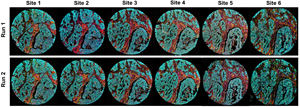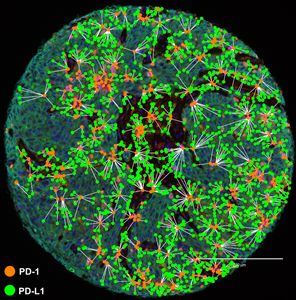-
Akoya Announces Publication of the MITRE Study, the First Multi-Institutional Analytical Demonstration of a Spatial Biology Workflow, in the Journal for ImmunoTherapy of Cancer
Source: Nasdaq GlobeNewswire / 19 Jul 2021 07:05:00 America/Chicago
MARLBOROUGH, Mass., July 19, 2021 (GLOBE NEWSWIRE) -- Akoya Biosciences, Inc., (Nasdaq: AKYA) The Spatial Biology Company®, today announced that the Phenoptics™ mIF solution was used in a multi-site study to demonstrate and validate an automated end-to-end workflow that characterizes PD-1/PD-L1 immune checkpoint signaling in tumor tissue samples. The paper titled, “Multi-institutional TSA-amplified Multiplexed Immunofluorescence Reproducibility Evaluation (MITRE Study),” was published in the Journal for ImmunoTherapy of Cancer (JITC) in July 2021. The MITRE results are an important step toward standardizing an automated mIF-based spatial biology workflow that provides the level of performance needed to support clinical trials and that can be applied to clinical testing in the future.
Top immuno-oncology and pathology experts from five institutions collaborated with Akoya to conduct the MITRE study, including Johns Hopkins University School of Medicine, Yale University School of Medicine, Earle A. Chiles Research Institute, The University of Texas MD Anderson Cancer Center, and Bristol Myers Squibb.
“I am very excited by the results of this study because it is the first multi-institutional study of its kind involving mIF, representing an approach that should be part of every effort to develop a biomarker platform for trials and eventual clinical use,” said Dr. David Rimm, Professor of Pathology at Yale University School of Medicine and one of the lead principal investigators on the study.
Immunotherapy utilizes the patient’s immune system to fight cancer and has delivered durable benefit to some subsets of patients with advanced disease, representing a significant step forward in the quest to conquer cancer. However, a majority of the patients still do not respond to treatment. There is a pressing need for accurate, predictive biomarkers to differentiate responders from non-responders. Recent studies have demonstrated that spatial biomarkers are able to predict immunotherapy response with greater accuracy than current methods1,2.
Spatial biology, a rapidly emerging field of science, allows researchers to map the interactions of tumor and immune cells across an entire tumor tissue section, without destroying the spatial context of the tissue, enabling a more accurate assessment of tumor-immune biology.
With the MITRE study, the authors sought to develop and validate a spatial biology workflow that is transferable among sites and delivers site-independent and reliable quantitative data for immunotherapy research.
Study details
The multi-institutional effort optimized an automated 6-plex biomarker assay focused on the PD-1/PD-L1 axis and assessed the inter- and intra-site reproducibility of the assay by measuring spatial biology parameters of tumor and immune cells within tissue samples. Among the parameters examined were tumor cell and immune cell subset densities, PD-L1 expression and location, and PD-1/PD-L1 spatial proximity.
Akoya’s Phenoptics™ workflow, which enables spatial phenotyping using mIF, demonstrated high concordance across multiple institutions. The study confirmed that quantitative measures of multiple biomarkers in a tissue section are reproducible at levels aligned with typical clinical testing standards. The authors also reported that quantitative mIF substantially outperforms challenging visual assessments, such as assessing PD-L1 positivity in immune cells, particularly in non-small cell lung cancer (NSCLC) samples.
“The foundational requirement for any platform including those delivering spatial phenotyping is the ability to fully demonstrate analytical robustness with a workflow that has the necessary throughput for large scale clinical studies. With the MITRE study and the robust end-to-end Phenoptics workflow, we believe Akoya is ideally positioned to support our customers’ translational and clinical research needs,” said Brian McKelligon, CEO of Akoya. “Along with our recent announced partnerships with AstraZeneca and Johns Hopkins, the MITRE Study is another significant milestone in moving spatial biology into the realm of patient phenotyping and improving immunotherapy outcomes in the future.”
For more information about Phenoptics, go to: akoyabio.com/Phenoptics
About Akoya Biosciences
As The Spatial Biology Company®, Akoya Biosciences’ mission is to bring context to the world of biology and human health through the power of spatial phenotyping. The company offers comprehensive single-cell imaging solutions that allow researchers to phenotype cells with spatial context and visualize how they organize and interact to influence disease progression and treatment response. Akoya offers two distinct solutions, the CODEX® and Phenoptics™ platforms, to serve the diverse needs of researchers across discovery, translational and clinical research. To learn more about Akoya, visit www.akoyabio.com.
Cautionary Note Regarding Forward Looking Statements
This press release contains “forward-looking statements” under applicable securities laws. In some cases, such statements can be identified by words such as: “may," "will," "could," "would," "should," "expect," "intend," "plan," "anticipate," "believe," "estimate," "predict," "project," "potential," "continue," "ongoing" or the negative of these terms or other comparable terminology, although not all forward-looking statements contain these words. Forward-looking statements include express or implied statements regarding our ability to achieve our business strategies, growth, or other future events or conditions. Such statements are based on our current beliefs, expectations, and assumptions about future events or conditions, which are subject to inherent risks and uncertainties, including the risks and uncertainties discussed in the filings we make from time to time with the Securities and Exchange Commission. Actual results may differ materially from those indicated in forward-looking statements, and you should not place undue reliance on them. All statements herein are based only on information currently available to us and speak only as of the date hereof. Except as required by law, we undertake no obligation to update any such statement.Investor Contact:
David Deuchler
Gilmartin Group LLC
investors@akoyabio.comMedia Contact:
Michelle Linn
Bioscribe, Inc.
774-696-3803
michelle@bioscribe.comReferences:
- Berry S, et al. Analysis of multispectral imaging with the AstroPath platform informs efficacy of PD-1 blockade. Science 2021
- Lu S, Stein JE, Rimm DL, et al. Comparison of Biomarker Modalities for Predicting Response to PD-1/PD-L1 Checkpoint Blockade: A Systematic Review and Meta-analysis. JAMA Oncol. 2019
Photos accompanying this announcement are available at
https://www.globenewswire.com/NewsRoom/AttachmentNg/bb00942d-f13c-49be-b7b5-5e0bdfbf23bchttps://www.globenewswire.com/NewsRoom/AttachmentNg/9140fa53-8d00-4a27-95bc-d40530de45c1
MITRE Reproducibility Study
The MITRE Study establishes the high reproducibility and robustness of Akoya Biosciences’ Phenoptics platform for spatial phenotyping in clinical research. Shown here are multiplex immunofluorescence images, from all the sites involved in the study, where six biomarkers were analyzed in breast cancer samples.
MITRE Spatial Proximity Analysis
Shown here is a representative image of a breast cancer sample where the spatial proximity of two of the six biomarkers were analyzed in the tissue. Measuring the proximity of PD-1+ and PD-L1+ cells in the tumor microenvironment, in addition to other spatial parameters, can enhance the predictive value of immunotherapy biomarkers.

